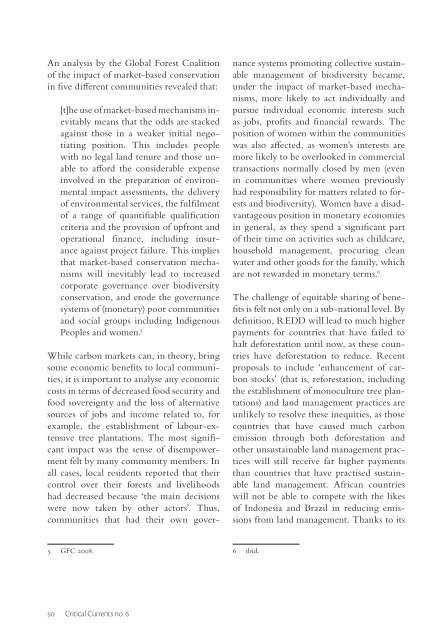Contours of Climate Justice - Dag Hammarskjöld Foundation
Contours of Climate Justice - Dag Hammarskjöld Foundation
Contours of Climate Justice - Dag Hammarskjöld Foundation
You also want an ePaper? Increase the reach of your titles
YUMPU automatically turns print PDFs into web optimized ePapers that Google loves.
An analysis by the Global Forest Coalition<br />
<strong>of</strong> the impact <strong>of</strong> market-based conservation<br />
in fi ve diff erent communities revealed that:<br />
[t]he use <strong>of</strong> market-based mechanisms inevitably<br />
means that the odds are stacked<br />
against those in a weaker initial negotiating<br />
position. This includes people<br />
with no legal land tenure and those unable<br />
to aff ord the considerable expense<br />
involved in the preparation <strong>of</strong> environmental<br />
impact assessments, the delivery<br />
<strong>of</strong> environmental services, the fulfi lment<br />
<strong>of</strong> a range <strong>of</strong> quantifi able qualifi cation<br />
criteria and the provision <strong>of</strong> upfront and<br />
operational fi nance, including insurance<br />
against project failure. This implies<br />
that market-based conservation mechanisms<br />
will inevitably lead to increased<br />
corporate governance over biodiversity<br />
conservation, and erode the governance<br />
systems <strong>of</strong> (monetary) poor communities<br />
and social groups including Indigenous<br />
Peoples and women. 5<br />
While carbon markets can, in theory, bring<br />
some economic benefi ts to local communities,<br />
it is important to analyse any economic<br />
costs in terms <strong>of</strong> decreased food security and<br />
food sovereignty and the loss <strong>of</strong> alternative<br />
sources <strong>of</strong> jobs and income related to, for<br />
example, the establishment <strong>of</strong> labour-extensive<br />
tree plantations. The most signifi -<br />
cant impact was the sense <strong>of</strong> disempowerment<br />
felt by many community members. In<br />
all cases, local residents reported that their<br />
control over their forests and livelihoods<br />
had decreased because ‘the main decisions<br />
were now taken by other actors’. Thus,<br />
communities that had their own gover-<br />
5 GFC 2008.<br />
50 Critical Currents no. 6<br />
nance systems promoting collective sustainable<br />
management <strong>of</strong> biodiversity became,<br />
under the impact <strong>of</strong> market-based mechanisms,<br />
more likely to act individually and<br />
pursue individual economic interests such<br />
as jobs, pr<strong>of</strong>i ts and fi nancial rewards. The<br />
position <strong>of</strong> women within the communities<br />
was also aff ected, as women’s interests are<br />
more likely to be overlooked in commercial<br />
transactions normally closed by men (even<br />
in communities where women previously<br />
had responsibility for matters related to forests<br />
and biodiversity). Women have a disadvantageous<br />
position in monetary economies<br />
in general, as they spend a signifi cant part<br />
<strong>of</strong> their time on activities such as childcare,<br />
household management, procuring clean<br />
water and other goods for the family, which<br />
are not rewarded in monetary terms. 6<br />
The challenge <strong>of</strong> equitable sharing <strong>of</strong> benefi<br />
ts is felt not only on a sub-national level. By<br />
defi nition, REDD will lead to much higher<br />
payments for countries that have failed to<br />
halt deforestation until now, as these countries<br />
have deforestation to reduce. Recent<br />
proposals to include ‘enhancement <strong>of</strong> carbon<br />
stocks’ (that is, reforestation, including<br />
the establishment <strong>of</strong> monoculture tree plantations)<br />
and land management practices are<br />
unlikely to resolve these inequities, as those<br />
countries that have caused much carbon<br />
emission through both deforestation and<br />
other unsustainable land management practices<br />
will still receive far higher payments<br />
than countries that have practised sustainable<br />
land management. African countries<br />
will not be able to compete with the likes<br />
<strong>of</strong> Indonesia and Brazil in reducing emissions<br />
from land management. Thanks to its<br />
6 ibid.
















